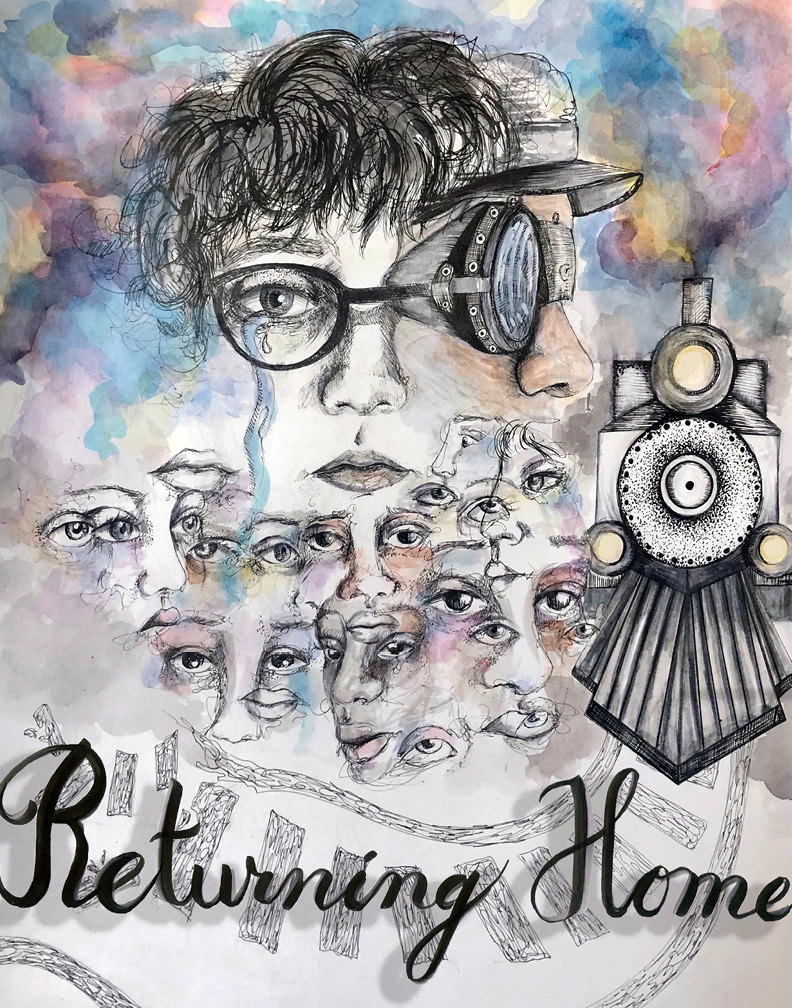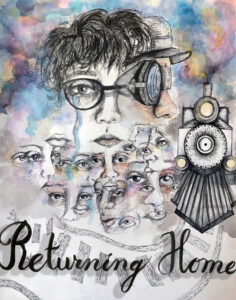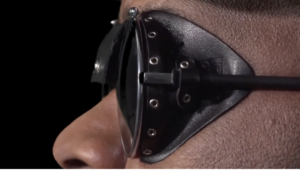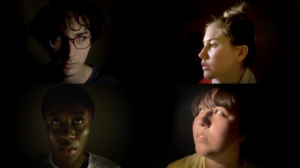
Short Film Review “Returning Home”
WATCH THE TRAILER HERE
First, the Recap:
What is it to simply BE? Why does it seem so overtly challenging to allow ourselves the opportunity to just lay back and breathe, to accept the true person we are, and experience the serenity we all desire? Life doesn’t often, if ever, work that way, for even in those times OF peace, accompanying it will be storms, sometimes of our own making. Therefore, what voice will we listen to to aid us in finding our way OUT of the turmoil and back into a better reality? Four individuals–Nickel (Nick Freedson), Appollonia (Mary Kate Magee), Lucinda (Kayci Rose) and Suli (Nneka Damali)–all share one thing in common–they are fighting severe inner battles which take on a myriad for forms. Yet, through a fantastical shared journey guided by the enigmatic Conductor (S. Todd Townsend), they all may come to face their demons, conquer their fears, release their anxieties, and find a depth of liberation desperately sought–and very well-deserved.
Next, my Mind:
It is a deeply impactful exploration of the cacophony that is life, the seemingly endless cycles of inner self-hurt we find ourselves in, discovering the willingness to confront it all, and the solace experienced when freedom is found that combine to form the core foundation of this uniquely and creatively executed 39-minute experimental short film from writer/director/producer Jamie Lazan and co-writers Nneka Damali, Nick Freedson, Mary Kate Magee, Kayci Rose, and S. Todd Townsend (aka: the film’s primary cast!). What first must be pointed out is that if there was actually a time where the roads this films takes us down was necessary–point of fact IMPERATIVE–to showcase and share with the world at large, it would be NOW. When we look around and see the constant waves of chaotic, unsettled state of affairs conducted between us as human beings currently, the division, the hatred, the anger, it’s a wonder that the struggles to genuinely SEE and ACCEPT yourself as you REALLY appears to be impossible. THIS has to CHANGE.
Beautifully conceived and brought to bear via crossing through multiple mediums of genres, film styles, actualities (real life vs. fantastical), and visual presentation (including several sequences cleverly and highly effectively put into play via Zoom!), the narrative that follows four young people and their fights for personal emancipation through being guided by a mysterious benefactor carries itself with compelling intent and definitive purpose, keeping the viewer’s attention the entire time, piquing the curiosity as to precisely how all that we take in will meld together to bring about a resolution that not only knits each character’s own distinctive voyage (another facet of the film’s overall approach I totally admired) together, but also delivers a farther-reaching scope and significance for all of them collectively, and hence by default, for us as well. This does occur by the time we arrive at the film’s equally well-crafted finale that evocatively opens the door, yes for appropriate endings, but also to newly refreshed paths to consider through conjecture.
Additionally, the specific utilization of spoken/rapped verse-based dialogue for the narrative’s mainly hidden “emcee” adds a magnificently engaging element to events, almost in a “Hamilton”-esque vein, and I applaud Lazan and Co. for choosing to employ this here, cause it intelligently and entertainingly conveys the ongoing underlying gist of the unfolding story we see. Thematically, it is a cascade of dreamlike, surrealistic introspection paired with in-the-present interactions that tackle a kaleidoscope of ideas including depression, fear, self-doubt, uncertainty, bullying, lies we tell ourselves, loneliness, the barriers we build, false self-image, denial, hiding our pain, our need for help, letting go of the past, persevering and overcoming these walls, taking time to just slow down and listen, and our need for each other among others, all displayed and expressed visually in literal and proverbial, spiritual and secular manner to illustrate AWARENESS when it comes to mental health and wellness, which this critic hopes the film will engender.
Ensemble casts are almost always a treat to watch, as the unified exchanges, reactions, and interconnections between them allow the story to mesh and evolve in a unique way as opposed to a more singular approach where specific actors are the focal points with others as the satellites orbiting them. Here, however, we’re actually given a fusion of both that deftly fuses both group and individual performances to make up the whole of the narrative, and it is an uncomplicated yet intricately, artistically complex combo that works very, very well. Freedson embodies the monotony of routine, a mundane existence fueled by confusion and loss of self-identity through his role as Nickel, a young boy trying to seek purpose, but feeling immersed within a sense of drowning and floating aimlessly. When he’s drawn to the metaphorical train that takes him through what he needs for his path to be revealed, it’s a cathartic and gratifying voyage that yields a rebirthing of directions to take, and Freedson’s body language and expressive acting carries this nicely.
Magee radiates the angst of heartbreak, anger, and stubbornness in accepting help or advice spurred on by a recent hurt via her performance as Apollonia, a girl simply looking to be loved and not cast aside but whose bitterness and sadness drives her to just sequester herself away, dealing with things in her own power rather than allowing release to come through connecting or listening to others. Yet, it is these elements she is forced to face on the train, and the freedom that arrives is likewise filled with encouragement that she is NOT alone, well portrayed with believable emotion and poise by Magee. Rose brings about the damaging air of bullying and its consequences on one’s psyche and self-image through her role as Lucinda, a girl who has taken the rejection and hurtful teasing she’s endured and focused it on being this way to others herself while retreating within, hiding away where she is “safe”. As the train transports her to a world reflecting a fantasy game-based reality, she must either recoil in the face of her own ideas of how unworthy she is or listen to the voice telling her she IS worth something and it’s time to stand up in that truth. I love how Rose has a natural bravado and energy that makes her character one to really root for.
Damali had what this critic felt was one of the more intensely emotive roles to engage with through her performance as Suli,a young girl unequivocally tormented by fear brought about by the otherworldly, haunting, menacing voice that causes more than its fair share of unease and total agony for her. Erratic thoughts, nightmarish dreams, and also being told she’s all alone, the train’s objective with her is an exercise in much needed mental stability and yearned for comfort that has a beautiful outcome to set her free. Damali’s navigation of the emotional extremes her character faces is just excellently presented. Then, we have Townsend as the titular Conductor, the de facto Master of Ceremonies for each character’s individual trials and triumphs who acts as the voice of challenge, reason, and emboldening motivation to press through and find their truths about themselves. His poetic means of speech only adds to his undeniably dynamic presence throughout, and Townsend executes this with smoothly delivered style, finesse, and eloquence.
Supporting appearances are, interestingly enough, made via dual roles for Damali and Rose (watch the film to see!) as well as Rebecca Magee who is voice only as Apollonia’s mother. So, in total, “Returning Home” is the eccelctic epitome of straightforward yet avant-garde indie filmmaking that captures us with its inventive visual process while imparting an all-too-timely and adeptly strong statement about our need for more mental health alertness so that we may all address it better, find our own train to embark upon to seek answers, rendezvous with relief, and ultimately abide within what we ALL need to have more of when understanding WHO we are and the quality of humanity we each represent–HOPE.
As always, this is all for your consideration and comment. Until next time, thank you for reading!





